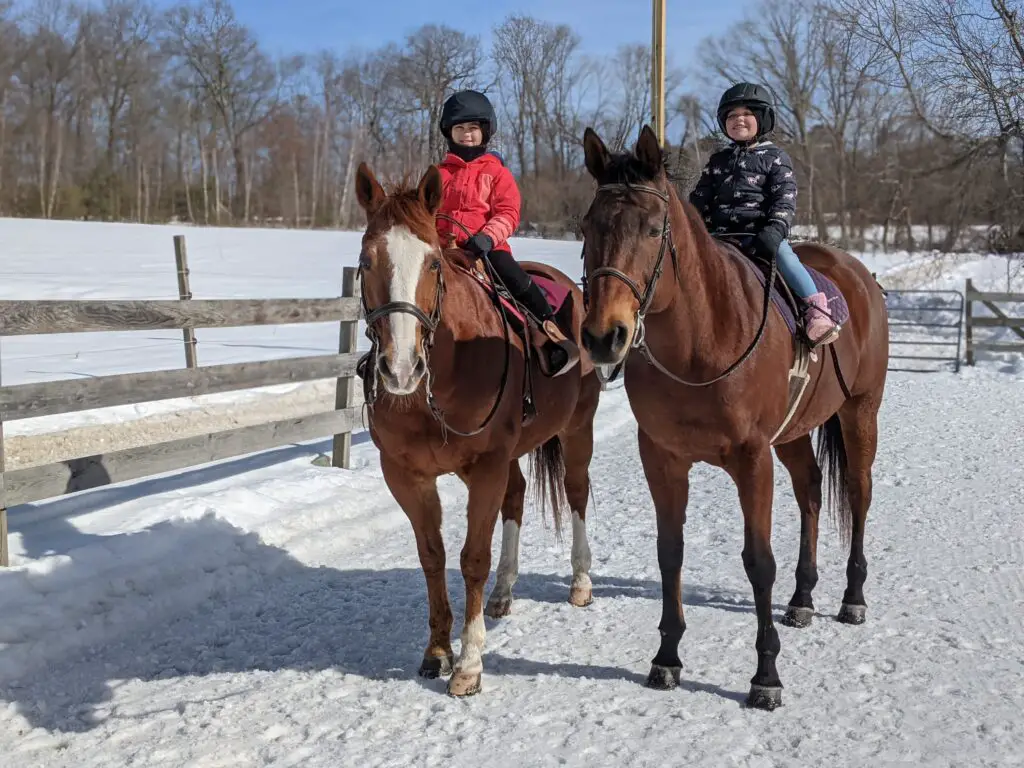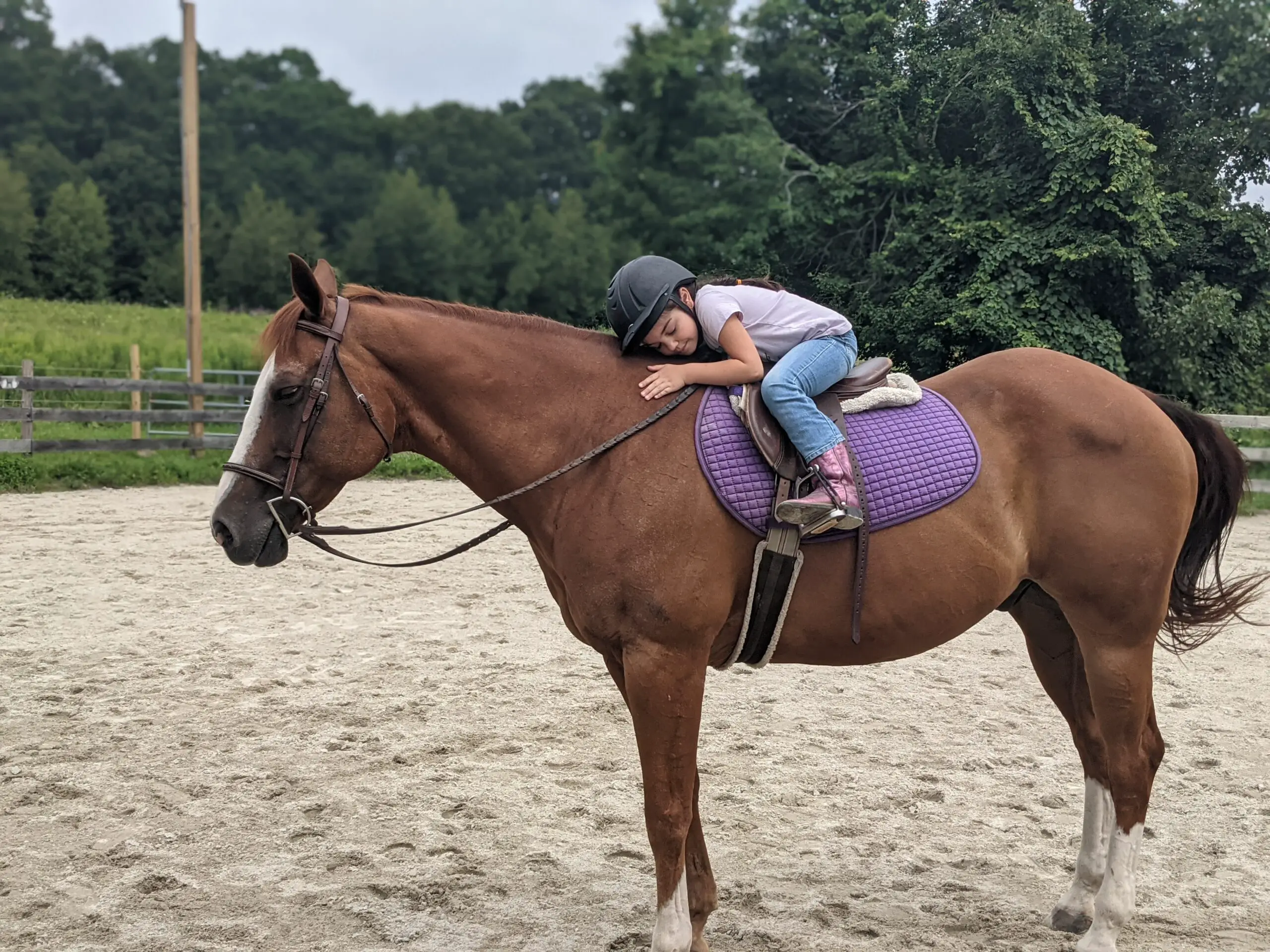You’re interested in taking riding lessons so you’ve made some calls to local farms. But, the sticker shock has you feeling a bit hesitant. Why are horseback riding lessons so expensive anyway? And is this really a hobby you want to get into?
The short answer is, horseback riding lessons are expensive because horses cost a lot to maintain and the overhead costs of running a farm are very high. The costs of keeping and caring for horses include feed, bedding, farm supplies, insurance, hoof care, veterinary care and more.
In this article we’ll review what riding lessons cost and the factors that are taken into consideration when farms set their lesson program prices.
What Do Horseback Riding Lessons Typically Cost?
The price of horseback riding lessons depends on your geographic location, discipline (type of riding) and expertise of the instructor and how many other riders are in the lesson. In the United States lessons start around $50 per hour on the low end and go upwards of $100-200 per hour. Not scared of the cost and want to find good quality riding lessons in your area? Check out this complete guide to finding and choosing the right instructor!
How To Choose A Horseback Riding Instructor
Why Are Horseback Riding Lessons Expensive? High Overhead Costs
Not only are horses large animals whom consume large amounts of feed, they are also highly sensitive. Maintaining a horse’s health is time consuming and costly and they require very specific care in order to keep them healthy. Below are the main operating costs for running a farm with healthy horses.
Feed & Supplies
The average horse weighs approximately 1,000 pounds, as you can imagine that requires quite a bit of feed! According to Buckeye Nutrition, most horses consume 1.5-2.5% of their body weight in feed per day. Plus, in order to keep their digestive system healthy they are built to graze throughout the day which means an almost constant supply of hay for horses that are not on pasture. Additionally, a 1,000 pound horse produces about 50 pounds of waste per day including manure and urine. The cost of feed and bedding adds up very quickly!
Routine Health Care
Routine health care for horses consists of semi-annual vaccinations along with annual health checks. It also includes hoof care which requires horses to have their feet trimmed and for some new shoes every 4 to 8 weeks on average. Think those designer shoes you like are expensive? Horse shoes for our horses in Massachusetts cost between $150 to $250 every 6 weeks. The price varies based on the type of shoe the horse needs and if they wear 2 or 4 shoes.
Additionally, horses’ teeth continue to grow throughout their life which can cause sharp edges and hinder their ability to eat and digest food properly. Routine dental care to float (file down the teeth) is needed once per year for some horses and two times per year for others. Again this is just an average and does not include any specific dental problems. There are also costs like de-worming, joint supplements or joint medications, chiropractic and massage work etc. Horses are athletes and in order to achieve optimal performance special care is needed to reduce wear and tear on their bodies.
Tack and Equipment
Tack and equipment like saddles, bridles, bits, lunging equipment and arena equipment is very costly. Not only is there an initial investment for the farm to purchase the equipment needed for a lesson program, there is also the cost of upkeep. Saddles alone cost anywhere from a few hundred dollars on the low end to several thousand dollars per saddle.
There are also the costs of horse blankets, leg protection, saddle pads, brushes, equipment used to to keep the farm running like tractors, wheelbarrows, jumps, mounting blocks etc.
Utilities, Insurance and Vehicles
Next there is the cost of utilities like water and electricity. Depending on the size of the facility, their amenities and the number of horses the utility costs can get quite high. Farms pay for special insurance for both teaching students, protecting the farm and some farms have insurance on their horses too. In the event that a person or horse becomes injured the farm owners need to be protected. Also included in this category is the cost of keeping and maintaining horse trailers and other farm vehicles. Just like your car, tractors and horse trailers need maintenance, breaks, tires, electrical work etc.

Horse Care Takes Many Hours Per Day In Addition To Time Spent Teaching
Just like in any other business time is money! Horse trainers have an overwhelming amount of responsibility beyond riding horses and teaching lessons. On smaller farms the trainer may also be the staff who cares for the horses and manages the farm. In larger facilities there are likely multiple employees keeping the farm running. However, horse trainers and farm owners oversee and coordinate with other staff. They take on a much greater work load because they have the experience and skills to keep the horses healthy. Trainers also need to coordinate with farriers, veterinarians and chiropractors. They may travel to try horses with clients interested in purchasing a horse. Or, they may spend a lot of time on the road competing and coaching clients who are competing at shows.
Horse trainers never have enough hours in the day and taking care of the horses takes up a lot of time. So, while the instructor may spend one hour teaching your riding lesson, they have likely put in several unpaid hours already that day.
Limited Capacity To Earn Revenue To Avoid Over-Working Horses
For any business the ability to scale can increase your profitability. However, horses are living beings, not machines so in order to scale, farm owners have to increase their head count. Horses can only work for so many hours per week and over working them can lead to health problems and injuries. If a horse becomes injured they could be out of work for weeks which would significantly impact the amount of clients a farm could service.
There is a very fine line between maximizing a horse’s capacity and keeping them sane, sound and healthy. This means that farms have a limited number of openings for students based on the size of the facility and the number of horses they can care for. If the number of students has to be capped at a certain point, then the farm needs to earn enough revenue per student to cover expenses. Notice I didn’t say make a profit? That’s right, many farms aren’t even making a profit even though you may feel their prices are very high.
Variations In Price Based On Expertise, Discipline and Type Of Lesson
Expertise
Riding lesson prices can vary based on the level of expertise of the trainer. Learning to ride well enough to teach other people how to ride horses takes years of experience. Not only do horse trainers need to understand how to ride well but they also need to understand horses. Without a good grasp on horse behavior and body language instructors can’t keep their students safe. Horse trainers are responsible for keeping students safe on a 1,000 pound flight animal and teaching them new skills at the same time.
Once you’ve learned the basics of horseback riding the rest is very technical and takes a huge amount of precision, balance and ability. Horse trainers spend many years learning the minute details that go into teaching horses and riders and they are always continuing their education.
Type of Lessons
The next factor that determines the price of your lesson will be the type of lesson you take. Most farms offer private, semi-private and group horseback riding lessons. Generally, when you ride with other students the price is slightly less than taking private lessons. However, you shouldn’t expect to ride in a group until you can ride safely and understand the basics. Many farms have beginner riders take private lessons for the first few months. Typically, until they can ride independently in order to keep other riders safe.
Discipline
Additionally, the type of discipline you choose to ride can impact the price of lessons. For example, the cost of dressage or jumping lessons will be expensive compared beginner lessons at a family friendly barn that does not specialize in one event.
Facility Type
One of the main factors that determines why horseback riding lessons are expensive is the type of facility you take lessons at. If you ride at a facility with a large indoor arena other amenities you can expect the price to be high. If you choose to ride at a facility with a lack of amenities the prices will be lower. All horse farms are expensive to run regardless of the amenities. And sometimes the larger facilities with more amenities have more students to earn revenue from. So, the difference in price may not be very significant. But, generally speaking riding at a facility with an indoor arena and heated tack room will cost more than a backyard farm with no arena.
How You Can Save On Horseback Riding Lessons
So now you know why horseback riding lessons are expensive, you’re not sure if you can swing it but you still want to ride.
There are two ways to save a little bit of money on horseback riding lessons. The first is to buy a package of riding lessons. Many farms offer a small discount when students pay for a full month of lessons at a time or a package of ten lessons instead of a la carte. If your farm does not offer this on their price list, you can always ask for a small discount for purchasing lessons up front.
The next way to save money on riding lessons is to do some chores at the barn and work for a portion of the cost. Not all farms offer this option especially if they have a full time staff to care for the horses. When farms offer this option they often times lose money. However, if the farm is currently short handed or needs help on holidays they may consider it. Additionally, you will need to have a certain level of experience to work at the barn safely so this is typically not an option for beginner riders.
If you are a beginner rider or interested in taking riding lessons, check out this article which will walk you through what to expect at your first lesson. It includes everything you need to know to be prepared ahead of time.
What To Expect At Your First Horseback Riding Lesson
I hope you’ve found this article helpful! If you did, please share!

